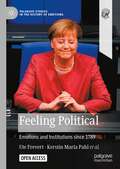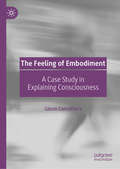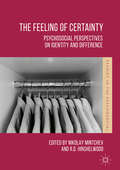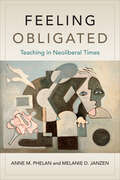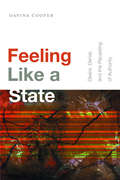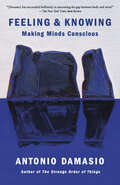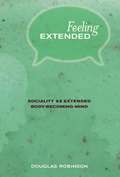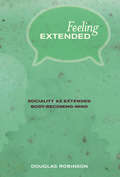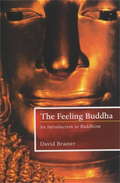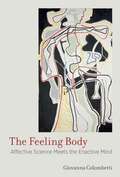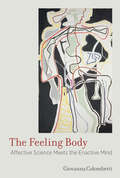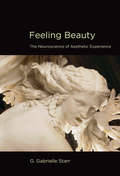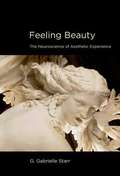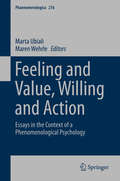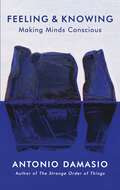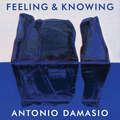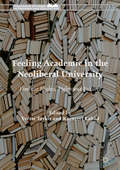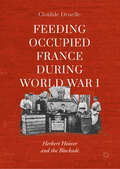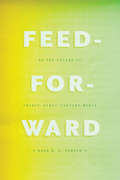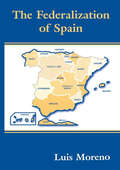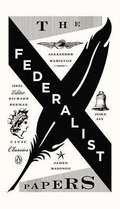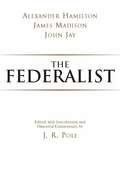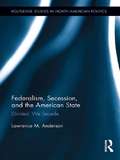- Table View
- List View
Feeling Political: Emotions and Institutions since 1789 (Palgrave Studies in the History of Emotions)
by Ute Frevert Kerstin Maria Pahl Francesco Buscemi Philipp Nielsen Agnes Arndt Michael Amico Karsten Lichau Hannah Malone Julia Wambach Juliane Brauer Caroline MoineHistoricizing both emotions and politics, this open access book argues that the historical work of emotion is most clearly understood in terms of the dynamics of institutionalization. This is shown in twelve case studies that focus on decisive moments in European and US history from 1800 until today. Each case study clarifies how emotions were central to people’s political engagement and its effects. The sources range from parliamentary buildings and social movements, to images and speeches of presidents, from fascist cemeteries to the International Criminal Court. Both the timeframe and the geographical focus have been chosen to highlight the increasingly participatory character of nineteenth- and twentieth-century politics, which is inconceivable without the work of emotions.
The Feeling of Embodiment: A Case Study in Explaining Consciousness
by Glenn CarruthersThis book proposes a novel and rigorous explanation of consciousness. It argues that the study of an aspect of our self-consciousness known as the ‘feeling of embodiment’ teaches us that there are two distinct phenomena to be targeted by an explanation of consciousness. First is an explanation of the phenomenal qualities – 'what it is like' – of the experience; and second is the subject's awareness of those qualities. Glenn Carruthers explores the phenomenal qualities of the feeling of embodiment using the tools of quality spaces, as well as the subject's awareness of those qualities as a functionally emergent property of various kinds of processing of these spaces. Where much recent work on consciousness focuses on visual experience, this book rather draws evidence from the study of self-consciousness. Carruthers argues that in light of recent methodological discoveries, awareness must be explained in terms of the organization of multiple cognitive processes. The book offers an explanation of anomalous body representations and, from that, poses a more general theory of consciousness. Ultimately this book creates a hybrid account of consciousness that explains phenomenology and awareness using different tools. It will be of great interest to all scholars of psychology and philosophy as well as anyone interested in exploring the intricacies of how we experience our bodies, what we are and how we fit into the world.
The Feeling of Certainty
by Nikolay Mintchev R. D. HinshelwoodThis book explores the concept of certainty, a term which is widely used in everyday language to designate a psychological experience or feeling but is rarely considered controversial or politically charged. The Feeling of Certainty argues that conversely this most ordinary of feelings plays a key role in shaping identity formation, social exclusion, prejudice, and commitment to political causes. The authors question what it means for the subject to feel certainty about her or his relationships to self and others. From where does the feeling of certainty originate, and how does it differ from modes of thought that are open to scepticism about the order of things? They draw on a wide range of theories, including those of Freud, Klein, Lacan, Wittgenstein, Bion, and Jung, challenging readers to consider the world of ideologies, symbols, and stereotypes in which certainty is entrenched, as well as the inter- and intra-psychic processes and defence mechanisms which form the unconscious foundation of the experience of certainty. This collection will offer valuable insight to scholars of psychology, politics, social science and history.
Feeling Obligated: Teaching in Neoliberal Times
by Anne M. Phelan Melanie D. JanzenFeeling Obligated combines theoretical insights with the first-hand experiences of Canadian teachers to illustrate the impact of neoliberalism – the installation of market norms into educational and social policies – on teachers’ professional integrity. Anne M. Phelan and Melanie D. Janzen illustrate the miserable conditions in which teachers teach, their efforts to navigate and withstand those circumstances, and their struggle to respond ethically to students, especially those already marginalized economically and socially. Exploring how educational policies attempt to recast teachers as skilled clinicians, the book revitalizes a conversation about teaching as a vocation wherein the challenge of obligation is of central concern. Haunted by what has already happened and threatened by what may yet occur, Feeling Obligated foregrounds the challenge of ethical obligation in teaching and makes a strong case for the revitalization of teaching as a vocation, involving commitment, resolve, and trust in a future yet to come.
Feeling Like a State: Desire, Denial, and the Recasting of Authority (Global and Insurgent Legalities)
by Davina CooperA transformative progressive politics requires the state's reimagining. But how should the state be reimagined, and what can invigorate this process? In Feeling Like a State, Davina Cooper explores the unexpected contribution a legal drama of withdrawal might make to conceptualizing a more socially just, participative state. In recent years, as gay rights have expanded, some conservative Christians—from charities to guesthouse owners and county clerks—have denied people inclusion, goods, and services because of their sexuality. In turn, liberal public bodies have withdrawn contracts, subsidies, and career progression from withholding conservative Christians. Cooper takes up the discourses and practices expressed in this legal conflict to animate and support an account of the state as heterogeneous, plural, and erotic. Arguing for the urgent need to put new imaginative forms into practice, Cooper examines how dissident and experimental institutional thinking materialize as people assert a democratic readiness to recraft the state.
Feeling & Knowing: Making Minds Conscious
by Antonio DamasioFrom one of the world&’s leading neuroscientists: a succinct, illuminating, wholly engaging investigation of how biology, neuroscience, psychology, and artificial intelligence have given us the tools to unlock the mysteries of human consciousness In recent decades, many philosophers and cognitive scientists have declared the problem of consciousness unsolvable, but Antonio Damasio is convinced that recent findings across multiple scientific disciplines have given us a way to understand consciousness and its significance for human life. In the forty-eight brief chapters of Feeling & Knowing, and in writing that remains faithful to our intuitive sense of what feeling and experiencing are about, Damasio helps us understand why being conscious is not the same as sensing, why nervous systems are essential for the development of feelings, and why feeling opens the way to consciousness writ large. He combines the latest discoveries in various sciences with philosophy and discusses his original research, which has transformed our understanding of the brain and human behavior. Here is an indispensable guide to understanding how we experience the world within and around us and find our place in the universe.
Feeling Extended: Sociality as Extended Body-Becoming-Mind
by Douglas RobinsonThe extended-mind thesis (EMT), usually attributed to Andy Clark and David Chalmers, proposes that in specific kinds of mind-body-world interaction there emerges an extended cognitive system incorporating such extracranial supports as pencils, papers, computers, and other objects and environments in the world. In "Feeling Extended," Douglas Robinson accepts the thesis, but argues that the usual debate over EMT -- which centers on whether mind "really" (literally, actually, materially) extends to body and world or only "seems" to -- oversimplifies the issue. When we say that mind "feels" as if it extends, Robinson argues, what extends is precisely feeling -- and mind, insofar as it arises out of feeling. Robinson explores the world of affect and conation as intermediate realms of being between the physical movements of body and the qualitative movements of mind. He shows that affect is transcranial and tends to become interpersonal conation. Affective-becoming-conative sociality, he argues, is in fact the primary area in which body-becoming-mind extends. To make his case, Robinson draws on a wide spectrum of philosophical thought -- from the EMT and qualia debates among cognitivists to the prehistory of such debates in the work of Hegel and Peirce to continental challenges to Hegelianism from Bakhtin and Derrida -- as well as on extensive empirical research in social psychology and important sociological theories of face (Goffman), ritual (Connerton), and habitus (Bourdieu).
Feeling Extended: Sociality as Extended Body-Becoming-Mind
by Douglas RobinsonA new view of the extended mind thesis argues that a stark binary opposition between really extending and seeming to extend oversimplifies the issue.The extended-mind thesis (EMT), usually attributed to Andy Clark and David Chalmers, proposes that in specific kinds of mind-body-world interaction there emerges an extended cognitive system incorporating such extracranial supports as pencils, papers, computers, and other objects and environments in the world. In Feeling Extended, Douglas Robinson accepts the thesis, but argues that the usual debate over EMT—which centers on whether mind really (literally, actually, materially) extends to body and world or only seems to—oversimplifies the issue. When we say that mind feels as if it extends, Robinson argues, what extends is precisely feeling—and mind, insofar as it arises out of feeling.Robinson explores the world of affect and conation as intermediate realms of being between the physical movements of body and the qualitative movements of mind. He shows that affect is transcranial and tends to become interpersonal conation. Affective-becoming-conative sociality, he argues, is in fact the primary area in which body-becoming-mind extends. To make his case, Robinson draws on a wide spectrum of philosophical thought—from the EMT and qualia debates among cognitivists to the prehistory of such debates in the work of Hegel and Peirce to continental challenges to Hegelianism from Bakhtin and Derrida—as well as on extensive empirical research in social psychology and important sociological theories of face (Goffman), ritual (Connerton), and habitus (Bourdieu).
The Feeling Buddha: An Introduction to Buddhism
by David BrazierThis account explains how the Buddha's path of wisdom and loving kindness grew out of the challenges he encountered in life. It explores enlightenment, nirvana, and the Four Noble Truths, presenting a picture of the Buddha as a very human figure whose success lay not in his perfection, but in his method of positively utilizing the energy generated by personal suffering.
The Feeling Buddha: An Introduction to Buddhism
by David BrazierThis account explains how the Buddha's path of wisdom and loving kindness grew out of the challenges he encountered in life. It explores enlightenment, nirvana, and the Four Noble Truths, presenting a picture of the Buddha as a very human figure whose success lay not in his perfection, but in his method of positively utilizing the energy generated by personal suffering.
The Feeling Body
by Giovanna ColombettiIn The Feeling Body, Giovanna Colombetti takes ideas from the enactive approach developed over the last twenty years in cognitive science and philosophy of mind and applies them for the first time to affective science -- the study of emotions, moods, and feelings. She argues that enactivism entails a view of cognition as not just embodied but also intrinsically affective, and she elaborates on the implications of this claim for the study of emotion in psychology and neuroscience. In the course of her discussion, Colombetti focuses on long-debated issues in affective science, including the notion of basic emotions, the nature of appraisal and its relationship to bodily arousal, the place of bodily feelings in emotion experience, the neurophysiological study of emotion experience, and the bodily nature of our encounters with others. Drawing on enactivist tools such as dynamical systems theory, the notion of the lived body, neurophenomenology, and phenomenological accounts of empathy, Colombetti advances a novel approach to these traditional issues that does justice to their complexity. Doing so, she also expands the enactive approach into a further domain of inquiry, one that has more generally been neglected by the embodied-embedded approach in the philosophy of cognitive science.
The Feeling Body: Affective Science Meets the Enactive Mind (The\mit Press Ser.)
by Giovanna ColombettiA proposal that extends the enactive approach developed in cognitive science and philosophy of mind to issues in affective science.In The Feeling Body, Giovanna Colombetti takes ideas from the enactive approach developed over the last twenty years in cognitive science and philosophy of mind and applies them for the first time to affective science—the study of emotions, moods, and feelings. She argues that enactivism entails a view of cognition as not just embodied but also intrinsically affective, and she elaborates on the implications of this claim for the study of emotion in psychology and neuroscience. In the course of her discussion, Colombetti focuses on long-debated issues in affective science, including the notion of basic emotions, the nature of appraisal and its relationship to bodily arousal, the place of bodily feelings in emotion experience, the neurophysiological study of emotion experience, and the bodily nature of our encounters with others. Drawing on enactivist tools such as dynamical systems theory, the notion of the lived body, neurophenomenology, and phenomenological accounts of empathy, Colombetti advances a novel approach to these traditional issues that does justice to their complexity. Doing so, she also expands the enactive approach into a further domain of inquiry, one that has more generally been neglected by the embodied-embedded approach in the philosophy of cognitive science.
Feeling Beauty: The Neuroscience of Aesthetic Experience
by G. Gabrielle StarrA theory of the neural bases of aesthetic experience across the arts, which draws on the tools of both cognitive neuroscience and traditional humanist inquiry.In Feeling Beauty, G. Gabrielle Starr argues that understanding the neural underpinnings of aesthetic experience can reshape our conceptions of aesthetics and the arts. Drawing on the tools of both cognitive neuroscience and traditional humanist inquiry, Starr shows that neuroaesthetics offers a new model for understanding the dynamic and changing features of aesthetic life, the relationships among the arts, and how individual differences in aesthetic judgment shape the varieties of aesthetic experience. Starr, a scholar of the humanities and a researcher in the neuroscience of aesthetics, proposes that aesthetic experience relies on a distributed neural architecture—a set of brain areas involved in emotion, perception, imagery, memory, and language. More important, it emerges from networked interactions, intricately connected and coordinated brain systems that together form a flexible architecture enabling us to develop new arts and to see the world around us differently. Focusing on the "sister arts" of poetry, painting, and music, Starr builds and tests a neural model of aesthetic experience valid across all the arts. Asking why works that address different senses using different means seem to produce the same set of feelings, she examines particular works of art in a range of media, including a poem by Keats, a painting by van Gogh, a sculpture by Bernini, and Beethoven's Diabelli Variations. Starr's innovative, interdisciplinary analysis is true to the complexities of both the physical instantiation of aesthetics and the realities of artistic representation.
Feeling Beauty
by G. Gabrielle StarrIn Feeling Beauty, G. Gabrielle Starr argues that understanding the neural underpinnings of aesthetic experience can reshape our conceptions of aesthetics and the arts. Drawing on the tools of both cognitive neuroscience and traditional humanist inquiry, Starr shows that neuroaesthetics offers a new model for understanding the dynamic and changing features of aesthetic life, the relationships among the arts, and how individual differences in aesthetic judgment shape the varieties of aesthetic experience. Starr, a scholar of the humanities and a researcher in the neuroscience of aesthetics, proposes that aesthetic experience relies on a distributed neural architecture -- a set of brain areas involved in emotion, perception, imagery, memory, and language. More important, it emerges from networked interactions, intricately connected and coordinated brain systems that together form a flexible architecture enabling us to develop new arts and to see the world around us differently. Focusing on the "sister arts" of poetry, painting, and music, Starr builds and tests a neural model of aesthetic experience valid across all the arts. Asking why works that address different senses using different means seem to produce the same set of feelings, she examines particular works of art in a range of media, including a poem by Keats, a painting by van Gogh, a sculpture by Bernini, and Beethoven's Diabelli Variations. Starr's innovative, interdisciplinary analysis is true to the complexities of both the physical instantiation of aesthetics and the realities of artistic representation.
Feeling and Value, Willing and Action
by Marta Ubiali Maren WehrleThis volume explores the role and status of phenomena such as feelings, values, willing, and action in the domain of perception and (social) cognition, as well as the way in which they are related. In its exploration, the book takes Husserl's lifelong project Studien zur Struktur des Bewusstseins (1909-1930) as its point of departure, and investigates these phenomena with Husserl but also beyond Husserl. Divided into two parts, the volume brings together essays that address the topics from different phenomenological, philosophical, and psychological perspectives. They discuss Husserl's position in dialogue with historical and recent philosophical and psychological debates and develop phenomenological accounts and descriptions with the help of Geiger, Heidegger, Merleau-Ponty, Plessner, Sartre, Scheler, Schopenhauer, and Reinach.
Feeling and Knowing: Making Minds Conscious
by Antonio DamasioIn recent decades, many philosophers and cognitive scientists have declared the question of consciousness unsolvable, but Antonio Damasio is convinced that recent findings in neuroscience, psychology and artifical intelligence have given us the necessary tools to solve its mystery. In Feeling & Knowing, Damasio elucidates the myriad aspects of consciousness and presents his analysis and new insights in a way that is faithful to our own intuitive sense of the experience.In forty-eight brief chapters, Damasio helps us understand the relation between consciousness and the mind; why being conscious is not the same as either being awake or sensing; the central role of feeling; and why the brain is essential for the development of consciousness. He synthesises the recent findings of various sciences with the philosophy of consciousness, and, most significantly, presents his original research which has transformed our understanding of the brain and human behaviour.Here is an indispensable guide to understanding the fundamental human capacity for informing and transforming our experience of the world around us and our perception of our place in it.
Feeling and Knowing: Making Minds Conscious
by Antonio DamasioIn recent decades, many philosophers and cognitive scientists have declared the question of consciousness unsolvable, but Antonio Damasio is convinced that recent findings in neuroscience, psychology and artifical intelligence have given us the necessary tools to solve its mystery. In Feeling & Knowing, Damasio elucidates the myriad aspects of consciousness and presents his analysis and new insights in a way that is faithful to our own intuitive sense of the experience.In forty-eight brief chapters, Damasio helps us understand the relation between consciousness and the mind; why being conscious is not the same as either being awake or sensing; the central role of feeling; and why the brain is essential for the development of consciousness. He synthesises the recent findings of various sciences with the philosophy of consciousness, and, most significantly, presents his original research which has transformed our understanding of the brain and human behaviour.Here is an indispensable guide to understanding the fundamental human capacity for informing and transforming our experience of the world around us and our perception of our place in it.
Feeling Academic in the Neoliberal University: Feminist Flights, Fights and Failures (Palgrave Studies in Gender and Education)
by Yvette Taylor Kinneret LahadThis book offers a contemporary account of what it means to inhabit academia as a privilege, risk, entitlement or a failure. Drawing on international perspectives from a range of academic disciplines, it asks whether feminist spaces can offer freedom or flight from the corporatized and commercialized neoliberal university. How are feminist voices felt, heard, received, silenced, and masked? What is it to be a feminist academic in the neoliberal university? How are expectations, entitlements and burdens felt in inhabiting feminist positions and what of 'bad feeling' or 'unhappiness' amongst feminists? The volume consider these issues from across the career course, including from 'early career' and senior established scholars, as these diverse categories are themselves entangled in academic structures, sentiments and subjectivities; they are solidified in, for example, entry and promotion schemes as well as funding calls, and they ask us to identify in particular stages of 'being' or 'becoming' academic, while arguably denying the possibility of ever arriving. It will be essential reading for students and researchers in the areas of Education, Sociology, and Gender Studies.
Feeding Occupied France during World War I: Herbert Hoover and the Blockade
by Clotilde DruelleThis book examines the history of Herbert Hoover’s Commission for Relief in Belgium, which supplied humanitarian aid to the millions of civilians trapped behind German lines in Belgium and Northern France during World War I. Here, Clotilde Druelle focuses on the little-known work of the CRB in Northern France, crossing continents and excavating neglected archives to tell the story of daily life under Allied blockade in the region. She shows how the survival of 2.3 million French civilians came to depend upon the transnational mobilization of a new sort of diplomatic actor—the non-governmental organization. Lacking formal authority, the leaders of the CRB claimed moral authority, introducing the concepts of a “humanitarian food emergency” and “humanitarian corridors” and ushering in a new age of international relations and American hegemony.
Feed-Forward: On the Future of Twenty-First-Century Media
by Mark B. N. HansenEven as media in myriad forms increasingly saturate our lives, we nonetheless tend to describe our relationship to it in terms from the twentieth century: we are consumers of media, choosing to engage with it. In Feed-Forward, Mark B. N. Hansen shows just how outmoded that way of thinking is: media is no longer separate from us but has become an inescapable part of our very experience of the world. Drawing on the speculative empiricism of philosopher Alfred North Whitehead, Hansen reveals how new media call into play elements of sensibility that greatly affect human selfhood without in any way belonging to the human. From social media to data-mining to new sensor technologies, media in the twenty-first century work largely outside the realm of perceptual consciousness, yet at the same time inflect our every sensation. Understanding that paradox, Hansen shows, offers us a chance to put forward a radically new vision of human becoming, one that enables us to reground the human in a non-anthropocentric view of the world and our experience in it.
The Federalization of Spain (Routledge Studies in Federalism and Decentralization #Vol. 5)
by Luis MorenoTraces the origins of the complex system of devolution and regional home rule that currently shapes and directs the Spanish political process.
The Federalist Papers
by Alexander Hamilton James Madison John JayThe Federalist Papers are a series of 85 articles encouraging the ratification of the United States Constitution. The Federalist Papers serve as a primary source for interpretation of the Constitution, as they outline the philosophy and motivation for the proposed system of government. Hamilton, Madison and Jay wanted to encourage the ratification and also set the standards for future interpretation of the Constitution. This book is essential for understanding the beginnings of the greatest democracy in the modern world.
The Federalist
by J. R. Pole James Madison Alexander Hamilton John JayNo competing edition of The Federalist offers nearly as much help in grasping Publius' arguments in defense of the new but unratified United States Constitution of 1787 as this new annotated edition by J. R. Pole. Essay by essay--with ample cross-references and glosses on 18th-century linguistic usage--Pole's commentary lays bare the intellectual background and assumptions of Alexander Hamilton, James Madison, and John Jay; explicates and critiques The Federalist's central concepts, rhetorical strategies, and arguments; and points up the international, national, and local facts on the ground relevant to Confederation Era New Yorkers, the constituency to which The Federalist was originally addressed.Pole's Introduction, a brief chronology of political events from 1688 to 1791, a brief overview of the themes of the essays, the text of the Constitution cross-referenced to The Federalist, and an index of proper names, concepts, and themes that also functions as a glossary further distinguish this edition.
Federalism, Secession, and the American State: Divided, We Secede (Routledge Studies in North American Politics)
by Lawrence M. AndersonOne important tradition in political science conceives of the Civil War in the United States serving as the functional equivalent of the English and French Revolutions, bringing with it the victory of liberal democratic industrialism over aristocratic agriculturalism. From this perspective, the Civil War is notable for its impact on the American state. Surprisingly however, little attention has been paid to the distinguishing features of this historic rupture in American politics. Through primary source research and the re-analysis of the rich historical literature about the antebellum era and the causes of the Civil War, Lawrence A. Anderson explores the relationship between federalism and the movement for secession in the United States during the pre-civil war era. Focusing primarily on South Carolina, Anderson carefully revisits theory on institutional analysis of political development to expose what caused secession in the United States.
Federalism in Greek Antiquity
by Beck, Hans and Funke, Peter Hans Beck Peter FunkeThe world of ancient Greece witnessed some of the most sophisticated and varied experiments with federalism in the pre-modern era. In the volatile interstate environment of Greece, federalism was a creative response to the challenge of establishing regional unity, while at the same time preserving a degree of local autonomy. To reconcile the forces of integration and independence, Greek federal states introduced, for example, the notion of proportional representation, the stratification of legal practice, and a federal grammar of festivals and cults. Federalism in Greek Antiquity provides the first comprehensive reassessment of the topic. It comprises detailed contributions on all federal states in Aegean Greece and its periphery. With every chapter written by a leading expert in the field, the book also incorporates thematic sections that place the topic in a broader historical and social-scientific context.
